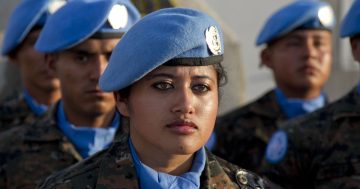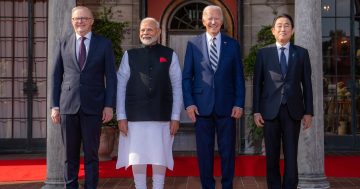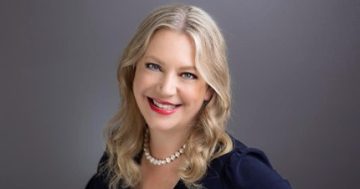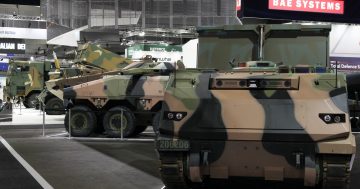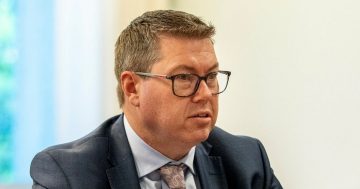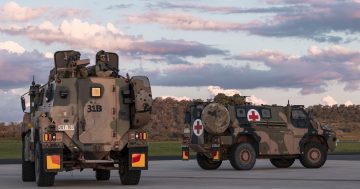Gai Brodtmann* discusses the lessons she learnt during a trip to Afghanistan and how they apply to today’s political climate.
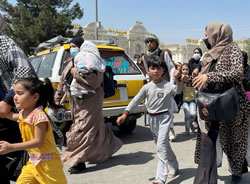 In 2011, I travelled to Afghanistan as part of a defence sub-committee delegation.
In 2011, I travelled to Afghanistan as part of a defence sub-committee delegation.
I was the only woman.
During the program, I met with two Australian female soldiers for a briefing on the issues facing women in Afghanistan.
The briefing was an optional extra in the delegation’s program and I was also the only member of the delegation to attend.
The soldiers had just returned to the Multinational Base in Tarin Kowt after an intelligence-gathering mission “beyond the wire”.
The soldiers shared the stories of the women they had met in Uruzgan Province.
Stories about the women’s lives, their hardship, their fears, their hopes and their dreams.
Stories about how they survived as women, right down to how they managed period cramps and the pain of childbirth.
And stories about their addiction to opium.
Because in rural villages in Afghanistan in the middle of a war zone, you can’t just drop in to the local chemist to get painkillers.
So you resort to a treatment that’s cheap, accessible, homegrown and abundant – poppy resin.
What these soldiers discovered, which was little understood at the time, was that women were using opium to manage their pain—the pain that comes from being a woman, and the pain of their reality.
And, in some instances, they found, men were deliberately addicting women to opium, to pacify and control them, to manage them.
The stories of those women in Uruzgan Province would not have been told were it not for those two female soldiers and gave added impetus to efforts to build women’s and maternal health centres in remote parts of Uruzgan Province.
Because until their mission, those women were unseen and unheard outside Afghanistan.
It was only those two female soldiers who gave them a voice and amplified it.
Those soldiers are no longer there, but that doesn’t mean the women of Afghanistan should be forgotten and unheard.
As the international community calls for the formation of an inclusive government in Afghanistan, we need to continue our efforts to amplify the voices of the women who still live there and advocate for female empowerment, education and economic participation.
Because too many of them are being silenced through harassment, censure, threats of violence or actual violence – they are in hiding, being hunted or have already been hunted.
And as we witness the horrors of another war unfolding in Ukraine we need to remember our sisters there too.
We need to fight for them to have a voice and be heard during this conflict, and in the transition out of it.
Because the experience of more than two decades in Afghanistan has taught us many lessons when it comes to empowering, listening and responding to women on national security and peace building.
And a lot of lessons on not what to do.
During that delegation to Afghanistan, I heard a powerful story that underscored the need to consult with women.
It was about a remote village in Afghanistan where the main source of water was a well.
As part of the international effort to stabilise and build capacity in Afghanistan, a well-meaning team of people from the international assistance community decided that this village needed all its houses plumbed to bring them into the 21st century.
But, unfortunately, no one consulted with the women in the village about whether this was a good idea.
Had they done that, they would have learned that the trip to the well each day was the only time a woman could get out of her house and commune with other women.
By plumbing their houses, the international community cut off women from their only daily source of freedom and engagement.
Now many lessons were learned from that well experience, but in some respects the world seems to be going backwards on the Women, Peace and Security agenda.
The agenda, which stemmed from a United Nation’s Security Council resolution more than 20 years ago, addresses the important and vital role of women in the prevention and resolution of conflict, in humanitarian assistance responses and in peace building.
The resolution calls on the international community to increase the participation of women and incorporate gender perspectives in all peace and security efforts.
In his Women, Peace and Security report to the United Nations Security Council in September last year, the Secretary General said:
“The recent takeover of Afghanistan by the Taliban has attracted much of the world’s attention.
But in the months leading up to it, the United Nations had already documented a record number of women killed in the country in 2020, including civil society activists and journalists, and the targeting of academics, vaccinators and even women judges in the Supreme Court.
“And yet, Afghan women were not included among the negotiators with the Taliban in 2020.
“When delegates representing the Taliban and the Government of Afghanistan met in Moscow in March 2021 to discuss the peace negotiations, there was only one woman among them.
“This juxtaposition of violence targeting women and their rights, on the one hand, and their extreme marginalization and exclusion, on the other, still encapsulates the women and peace and security agenda in 2021.”
He outlined that:
“In 2020, women represented only 23 per cent of delegates in peace processes led or co-led by the United Nations.
“None of the ceasefire agreements reached between 2018 and 2020 included gender provisions.
“Only 5.2 per cent of military troops in peace operations were women.
“Bilateral aid to women’s rights organisations and movements in fragile or conflict-affected countries remains strikingly low, well below 1 per cent, and has been stagnant since 2010.”
Multiple studies over multiple decades have shown that peace lasts longer and conflict zones become more stable when women participate in the negotiations and decision-making.
Peace processes involving women as witnesses, signatories, mediators and negotiators have a 20 per cent increase in the probability of lasting more than two years, and a 35 per cent increase in the probability of lasting 15 years.
Women shaping their future shows the lives of women, and their community, are improved for the long term.
Here in Australia, the numbers of women in every field of national security are on the rise, particularly in leadership positions.
But there is still more work to be done, and we need to keep applying the pressure for change.
The Lowy Institute’s Foreign Territory: Women in International Relations report of 2019 found that it has been more than 50 years since the Commonwealth ‘marriage bar’ was lifted in 1966 in Australia.Since then, more than 30 major white papers, reviews, and inquiries had been produced that have shaped Australia’s international relations architecture and influenced our foreign and security policy.
At the time of the report, none of these major policy-setting exercises had been led by a woman in more than half a century.
It’s now time to normalise the presence and voices of women in national security, here and overseas.
We need to set a target for speakers and panellists at national security events organised by government agencies or organisations that receive government support through funding, venues or speakers—domestically and internationally.
The Government has set a target of 50 per cent of women holding Government board positions overall, with at least 40 per cent of positions at the individual board level.
The same 50/40 rule should be applied to government funded or supported national security events.
And no more excuses that the female talent doesn’t exist.
The talent exists in spades, in every national security field.
While the numbers in some fields may still be in the single digits, the women are there.
Finding them just requires a bit more lateral and creative thinking, a broadening of networks and an end to the lazy churn of the same male voices.
The 50/40 rule should also apply to national security and international relations task forces and papers, and publications and journals produced by government agencies and government-funded organisations.
And reporting on performance on the 50/40 rule should be done through the Women, Peace and Security National Action Plan interdepartmental committee and review process, with audits by the Australian National Audit Office.
National security parliamentary committees also shouldn’t be immune from the 50/40 rule.
Currently, the Parliamentary Joint Committee on Intelligence and Security has 36 per cent women.
The Joint Standing Committee on Foreign Affairs, Defence and Trade has just 25 percent.
The application of the 50/40 rule for parliamentary committees inquiring into national security would be a good start, as would a
cross-party parliamentary friends group on Women, Peace and Security.
We need to make women’s involvement in peace and security decision- and policy-making and practice, here and throughout the world, mundane, everyday and unremarkable.
And that starts with women having a seat at the table, according to the renowned women’s rights defender, peace negotiator, former member of the Afghan Parliament and its first-ever female Deputy Speaker, Fawzia Koofi.
Because if they aren’t around that table, they end up being the dinner.
*Gai Brodtmann is a former Member for Canberra, shadow frontbencher on cyber security and defence, joint parliamentary committee deputy chair, diplomat, small business owner and public servant.
This article first appeared at broadagenda.com.au.



